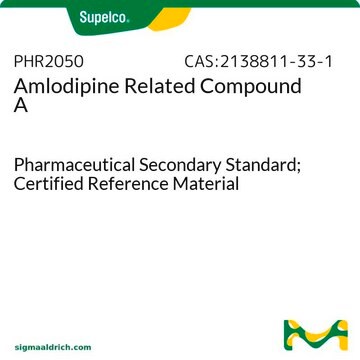PHR1212
Anisole
Pharmaceutical Secondary Standard; Certified Reference Material
Sinónimos:
Methoxybenzene, Methyl phenyl ether
About This Item
Productos recomendados
grade
certified reference material
pharmaceutical secondary standard
Quality Level
agency
traceable to USP 1037011
vapor density
3.7 (vs air)
vapor pressure
10 mmHg ( 42.2 °C)
CofA
current certificate can be downloaded
autoignition temp.
887 °F
technique(s)
HPLC: suitable
gas chromatography (GC): suitable
refractive index
n20/D 1.516 (lit.)
bp
154 °C (lit.)
mp
−37 °C (lit.)
density
0.995 g/mL at 25 °C (lit.)
application(s)
pharmaceutical (small molecule)
format
neat
storage temp.
2-30°C
SMILES string
COc1ccccc1
InChI
1S/C7H8O/c1-8-7-5-3-2-4-6-7/h2-6H,1H3
InChI key
RDOXTESZEPMUJZ-UHFFFAOYSA-N
¿Está buscando productos similares? Visita Guía de comparación de productos
General description
Application
Other Notes
Footnote
signalword
Warning
hcodes
Hazard Classifications
Flam. Liq. 3 - STOT SE 3
target_organs
Central nervous system
Storage Class
3 - Flammable liquids
wgk_germany
WGK 2
flash_point_f
109.4 °F - closed cup
flash_point_c
43 °C - closed cup
Elija entre una de las versiones más recientes:
Certificados de análisis (COA)
¿No ve la versión correcta?
Si necesita una versión concreta, puede buscar un certificado específico por el número de lote.
¿Ya tiene este producto?
Encuentre la documentación para los productos que ha comprado recientemente en la Biblioteca de documentos.
Los clientes también vieron
Nuestro equipo de científicos tiene experiencia en todas las áreas de investigación: Ciencias de la vida, Ciencia de los materiales, Síntesis química, Cromatografía, Analítica y muchas otras.
Póngase en contacto con el Servicio técnico









